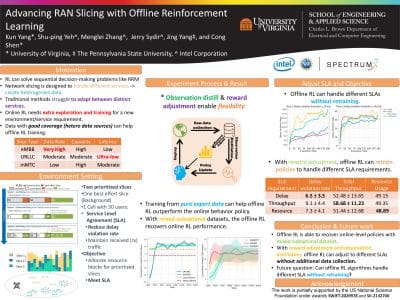Authors
Kun Yang, Shu-ping Yeh, Menglei Zhang, Jerry Sydir, Jing Yang and Cong Shen
Abstract
Dynamic radio resource management (RRM) in
wireless networks presents significant challenges, particularly
in the context of Radio Access Network (RAN) slicing. This
technology, crucial for catering to varying user requirements,
often grapples with complex optimization scenarios. Existing
Reinforcement Learning (RL) approaches, while achieving good
performance in RAN slicing, typically rely on online algorithms
or behavior cloning. These methods necessitate either continuous
environmental interactions or access to high-quality datasets,
hindering their practical deployment. Towards addressing these
limitations, this paper introduces offline RL to solving the RAN
slicing problem, marking a significant shift towards more feasible
and adaptive RRM methods. We demonstrate how offline RL can
effectively learn near-optimal policies from sub-optimal datasets,
a notable advancement over existing practices. Our research
highlights the inherent flexibility of offline RL, showcasing its
ability to adjust policy criteria without the need for additional
environmental interactions. Furthermore, we present empirical
evidence of the efficacy of offline RL in adapting to various
service-level requirements, illustrating its potential in diverse
RAN slicing scenarios

